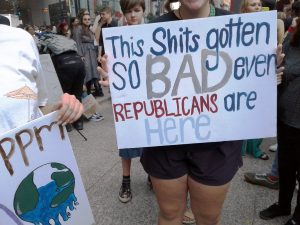
Several weeks have passed since the worldwide youth climate strike on September 20, 2019, but I still cannot get over my experience at the rally in Chicago. Not because I share the agenda of the participants. It is exactly the opposite, as I expressed before; I am more concerned about the politics of climate change than the climate change itself. In this sense, the picture above unintentionally explains my presence there.
Driving to the event, I listened to the live report on WBEZ, a Chicago public radio station, with Jerome McDonnell as the host. Enthusiastic about the event, he interviewed a few teenagers. Despite their young ages his interlocutors had already mastered climate change bunkum. Community dialogue, environmental justice, legislative actions, green industrial revolution and climate justice are just examples of lofty-sounding phrases they used in their political canvassing.
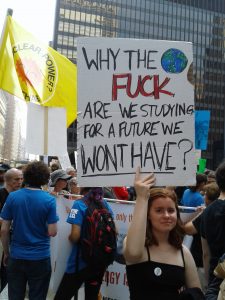
At their age, I had similar tendencies in my writing, but my literature teacher crossed out all the instances of frothiness with a red pen. Times have changed; their teachers brought them to the rally. Instead of learning in school, they were teaching the rest of us that learning is unnecessary, as the attached pictures document.
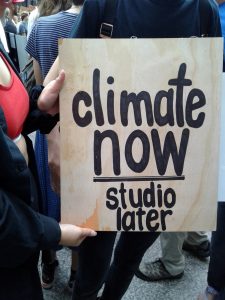
When I was at Greta Thunberg’s age, I read somewhere a sarcastic comment that the peak of the development of a human mind must be somewhere between the age of five and 18, because at five a young person has all the questions but at 18 has all the answers. This comment was on the margin of the youth revolts that shook the United States and many other Western countries in 1960s. For me, personally, it was a reminder that before me, for thousands of years, people have been resolving problems like ours. Knowledge of these previous experiences should be the prerequisite to any intelligent conversation about challenges we face.
This is not the way youngsters in the rally saw it. In their view adults do not listen to the educated; hence, education is not needed, as – in times of science and technology revolutionizing every aspect of our lives – politics are still conducted by yelling and arms wrenching, exactly as it was done by our Stone Age ancestors. The picture below perfectly reflects this trend in the climate change debate.

This young lady has not learned yet that educated people listen to others, both more and less educated, but they question what they hear, exactly because they are educated. She does not know yet that science is not a religion; that people can have legitimate reasons for difference of opinions. Speaking with uppish self-confidence, she probably had not heard about an ancient philosopher humbly noticing “I know that I know nothing.” She has not spent enough time in school yet to learn that she can enjoy all the wonders of our civilization only because every single advancement happened thanks to someone challenging those claiming to be more knowledgeable. It sounds comic when a high school student calls “uneducated” people such as Prof. Ivar Giaever, a Nobel laureate in physics. It is not laughable, however, when this approach is taken seriously and might shape our future.
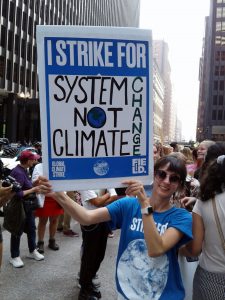
It is natural for young people to challenge the establishment. One can do it the way Steve Jobs did it, by working hard to prove the establishment wrong; to do something others “knew” could not be done. The alternative is in applying political pressure on the establishment to do something for us without us doing any actual work. The picture below tells us the kind of thinking behind the worldwide climate strike on September 20.
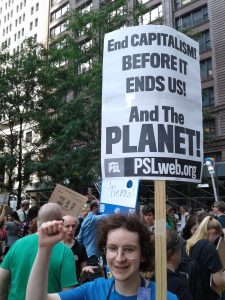
From conversations that Jerome McDonnell had on his radio program with rally organizers, we know what kind of system change is on the minds of people behind this movement.
Kyra Woods from the Sierra Club was talking enthusiastically about the holistic approach they take to “catalyze municipal actions to transition our energy economy.” They “envision a 100% clean, renewable energy economy in cities.” They “ask municipalities large and small to be behind this effort.” All of this sounds lofty and noble. But for an educated person, it sounds dangerous because it means rejection of the fundamental principle of the American political system that individuals, not government, run the economy. Kyra Woods does not work on better technologies for solar panels that would make it profitable to use them. She does not appeal to her fellow citizens to buy hybrid cars because they use about half of gas comparing to conventional ones. She and her colleagues from the Sierra Club arbitrarily decided that their goal for 2020-2035 is to have all buildings powered by 100% clean energy, and by 2040, maybe even earlier, to have electric buses. This political agenda is in complete abstraction from economic reality, because we should take “planet over profit.” Jerome McDonnell spotted a banner claiming this, but I could not find it to take a picture of it.
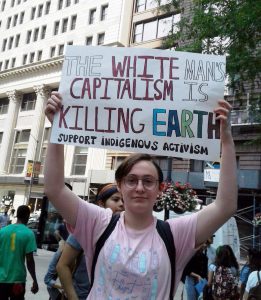
Kyla Johnson from People’s Lobby, one of the rally organizers, was more direct in explaining to WBEZ listeners that they “are attacking things such as the climate crisis from different angles but always trying to get to the root causes, like capitalism, corporate greed and fossil fuel industries.” For her group climate change politics “is an opportunity for so many generations to recognize how long we have prioritized profit over the well-being of our communities.” There were signs expressing this line of thinking.
Jerome McDonnell from WBEZ was swallowing this socialistic propaganda without hesitation. In another instance he nodded to the comment that “the burden of the climate change trauma will be carried by people from marginalized communities.” Young activists might not know yet, but he should know that for the poor it never rains, it pours. Hence, the solution is not in institutionalized charity, in taxing the rich so government can help the poor. The solution is in advancing the economy so there would be fewer of the poor.
Half a century ago, most people in China had not much better lives than their neighbors in North Korea. About 40 years ago, China adopted a purely capitalistic, profit-oriented economic model, lifting out of poverty about one billion people. Before that, capitalism brought prosperity in Europe and in North America. Would not it be logical to ask young people advocating against capitalism if they know any other way to create a prosperous society that worked before.
Enamored with socialistic ideas, the WBEZ reporter could not acknowledge that chasing profit is the engine powering progress of our civilization. Hence, he could not afford even a tiny dose of skepticism when talking with the rally participants and organizers. I would let it slide, if not that this is just one example of how the climate change issue is presented on all WBEZ programs. On another prime-time political program, “1A,” a few months ago Joshua Johnson asked for alternative opinions on climate change. I emailed him some, but did not even receive an acknowledgment, and did not hear any alternative voices on his program.
Intending a different meaning, the sign below confirms that the whole hoopla about climate is just in order to obtain a political change.
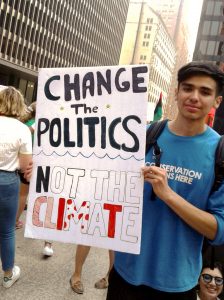
On the streets people can express their disapproval for the status quo. Actual changes happen when people sit at the table. Politics is the art of compromise. It takes time and experience to realize that. It takes a dose of reality to recognize that whatever we might want to do, we need money. Without profit there is no money to do anything. It takes some maturity to accept that when chasing profit, not all succeed to the same degree. It requires some understanding of human behavior in order to know that we destroy the very mechanism propelling our progress if we empower the government to take profit from those who are more successful in order to satisfy the aspirations of the less fortunate. Lastly, the challenges of global warming, despite being different from what our ancestors had dealt with, are not the first serious challenges humanity has faced.
After the fuss on the streets, young people can make a change by deepening their knowledge of climate change, including learning the arguments of people with opposing views. In our polarized reality, the greatest opportunity for young people is to free themselves from the biases of adults. With this approach, which is natural for youngsters, distrust of the establishment can be an asset. As has happened many times before, addressing a major challenge can become a hallmark of this generation. Sadly, this is not what I see happening; I see youngsters manipulated by the establishment.
In the atmosphere of the rally, I sensed similarities to the youth revolt of the 1960s, which was memorialized in the slogan “Don’t trust anyone over 30.” Today, this age seems to have been lowered, as Jerome McDonnell spoke loftily that “young people speak with the moral authority,” seconded by Kyla Johnson that they have a “new moral vision.” A few old folks I spoke with at the rally told me to listen to the voice of the young. The truth is that they are still childishly naïve and not educated, just as we all were at their age. After all, most of them have not yet graduated from high school.
Inadvertently, Jerome McDonnell turned the very idea of this rally into its caricature when he talked sincerely with a 9-year-old boy holding a sign that read “climate change is bad.” I can accept that a 16-year-old might have their own opinion on the matter, regardless of how naïve or uneducated it might
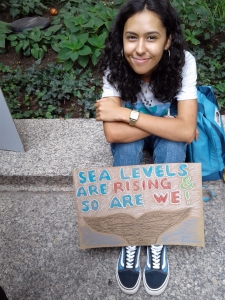
be. A 9-year-old can only repeat what he has been indoctrinated with. In this respect, it is a good sign that climate change alarmists need to bring children to their rallies; it means that adults are not buying it. We can only hope that maturing youngsters will become more skeptical, too.

 Many tell us what to think. I ask my readers to be skeptical. Question me and others.
Many tell us what to think. I ask my readers to be skeptical. Question me and others. 
